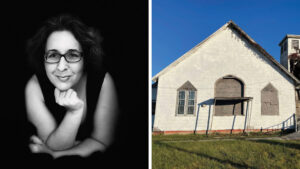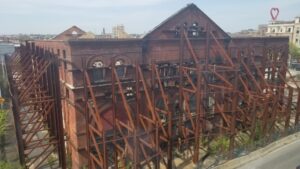Keswick’s BrainWise Workshop helps seniors remain mentally active.
It’s getting past lunchtime. The class is well into its second hour, yet the handful of students remain completely engaged in the lesson. All eyes are on instructor Lisa Clerman, who writes the word Hypothalamus on the whiteboard.
“It’s basically a control center related to your sleep,” she explains. The students work to find at least 30 words derived from the longer word written on the board. Clerman gently prods them to consider words they haven’t yet thought of, and ultimately they surpass that goal. Before class wraps up, Clerman asks the students to think of one thing they can do to get a better night’s sleep, a central theme of this week’s class.
Mostly in their 60s and 70s, Clerman’s students are enrolled in the BrainWise Workshop offered as part of Keswick Multi-Care Center’s new Wise & Well Center for Healthy Living. For more than 135 years, Keswick has served as a nursing home to seniors. Last September, Keswick launched its newly renovated hub of community health services, the Wise & Well Center.
The membership-based center, adjacent to Keswick’s nursing home in Roland Park, invites older community residents to stay physically and mentally active and connected. For an annual membership fee, seniors can take advantage of the tastefully renovated 14,000-square-foot space to engage in physical activity, visual arts, classroom learning and more, all led by skilled experts like Clerman, a community engagement specialist at Keswick.
Clerman has been a recreational therapist for more than three decades and has worked with various populations. But since the 1990s, she has focused primarily on older adults and noticed some significant cultural shifts in how people age.
“People are aging in place longer,” she says. “We’re getting people in their upper 80s who still live in the community and want to be lifelong learners.”
Professionals like Clerman make it possible for many seniors to achieve that goal. “If you make classes fun and upbeat, they don’t realize the educational stuff that’s going on,” she says.
Clerman calls creating a fun milieu Keswick’s “special sauce” and believes it’s essential to getting seniors to keep coming to classes with such serious themes as chronic diseases and cognitive impairment.
While the seniors who participate in Keswick’s community health programming live independently, Clerman says that mild cognitive impairment affects a fair amount of her students. While the BrainWise Workshop is indeed fun and produces lots of spontaneous smiles from students, one of the reasons they attend is to stave off dementia, of which mild cognitive impairment is considered a precondition.
With that in mind, at the onset of the workshop — part of Keswick’s “Signature Brain Series” — Clerman administers a brief cognitive assessment tool to gauge students’ individual levels of cognition. Students also take a similar post-class assessment to determine if there have been any changes during the course of the six-week period.
In between, Clerman incorporates into the classes an individualized and varied approach to stimulating her students’ minds, for example, using what she calls “brain tricks” to help students remember names and other facts in the short-term.
“I’ve been facilitating this class for three years. And in that time, the vast majority of students who work on these brain challenges improve,” Clerman says.
Phyllis Becoat, 67, who lives with her husband in an independent senior apartment complex in Baltimore, is a devoted student of Clerman’s. About five years ago, she was considering retiring from her job as a cardiac technician. Then, she had a minor stroke, which forced her into retirement.
While she still volunteers and takes public transportation to get around, Becoat says she struggles with certain tasks. “Sometimes, things don’t connect. I know what I want to say, but I can’t get it out,” she says.
Dutifully, she works at the puzzles and other brain activities presented during class, and appreciates the opportunity to take home additional ones for practice. “It’s really awesome. I’ve made some new friends,” Becoat says. “I love coming here.”
Karin Schley, 69, enrolled in the BrainWise Workshop after witnessing the mental decline of a close friend who now lives in Keswick’s nursing home facility. “Watching the states she has gone through … it made me aware of getting older and the changes that can happen to you,” she says.
So before regularly visiting her friend at the nursing home, Schley applies herself in Clerman’s class. “Lisa’s very inspirational,” Schley says. “She brings out whatever you need to have brought out, encouraging you to use your brain more. She doesn’t push you beyond your limits. She works with you to eventually expand your limits.”
Clerman says working closely with her students is highly rewarding. “They have so much knowledge,” she says. “Even people who are having memory issues … the stories they tell.”
For information, visit choosekeswick.org.





